The OBEDI LEAD Fellow is a rising third or fourth year medical student who works with the OBEDI and is supported by a year-long stipend. The Fellow works closely with the OBEDI under the guidance of the Associate Dean for Student, Trainee and Faculty Belonging and the Assistant Dean for Curriculum on Diversity, Inclusive Teaching, and Learning to support programming and initiatives in the Office.
OBEDI Fellowship
The Office of Belonging, Equity, Diversity, and Inclusion (OBEDI) Fellows Program is an opportunity for a medical student to develop skills in leadership, collaboration, and program development through the creation of initiatives that support the mission of the OBEDI.
Breadcrumb
OBEDI Fellowship
The Office of Belonging, Equity, Diversity, and Inclusion (OBEDI) Fellows Program is an opportunity for a medical student to develop skills in leadership, collaboration, and program development through the creation of initiatives that support the mission of the OBEDI.
Previous Fellows
-
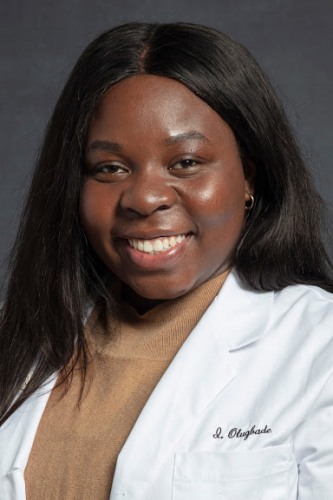
Idowu Olugbade MD'24
2023 - 2024 OBEDI LEAD FellowIdowu 'Idee' (She/her) is a first-generation Nigerian-American medical student. Born in Nigeria, her family migrated to the United States when she was 6 years old, and she grew up in Pittsburgh, PA. After completing her undergraduate studies in Behavioral Neuroscience at Lehigh University, Idee worked as a community health worker in Baltimore, MD. This invaluable experience served as a catalyst, igniting her passion for medicine. In 2020, Idee embarked on her medical education journey at The Warren Alpert Medical School.
At the medical school. Idee is a concentrator in the Reproductive Health Scholarly Concentration. She previously served as the co-president of The Warren Alpert Medical School of Brown University's Student National Medical Association (SNMA) chapter and continues her involvement with SNMA as the regional treasurer. She is also actively engaged within the medical school, having served on the Curriculum Committee for the past 3 years. Idee founded a disability advocacy and justice club at the medical school and co-founded the medical school's running club, the Serotonin Seekers of RI (SSRIs). Additionally, Idee is deeply involved in the Providence community, volunteering with the various organizations, including the Gynecological Clinic at Clinica Esperanza, and inspiring local middle school and high school students to pursue careers in medicine. Her clinical interests lie in pediatrics, where she aims to make positive impact on the lives of young patients and their families. Outside of her academic pursuits, Idee finds joy in photography, playing soccer, solving puzzles, reading fiction books, and spending quality time watching cartoons with her niece and goddaughter whenever possible.
She is excited to be the OBEDI LEAD Fellow for 2023-2024 and is looking forward to working with the administration and students.
-
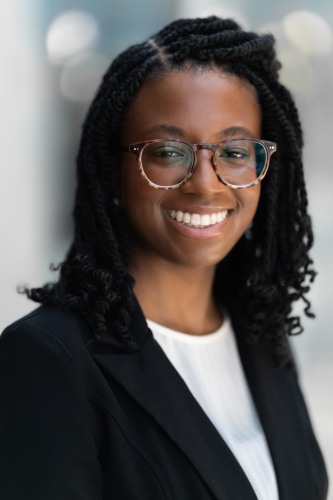
Olivia Cummings MD'24
2022-2023 OBEDI LEAD FellowOlivia (she/her) was born in the Bronx, NY. She is the youngest daughter of her Black American mother and Jamaican father and is so grateful to have been given the gift of belonging to two vibrant and proud communities. Passionate about having a role in alleviating the many structural inequities she witnessed as a child and teenager, Olivia came to Brown in 2015 as a student in the Program in Liberal Medical Education (PLME), where she studied Biochemistry & Molecular Biology.
Interested in learning more about how physicians can be forces for change in the population health realm, Olivia matriculated to The Warren Alpert Medical School of Brown University in 2019 as a member of the Primary Care-Population Medicine combined MD/ScM program. In medical school, she has been involved in the Student National Medical Association (SNMA), White Coats 4 Black Lives, The Medical School Student Senate, student clinics (gynecology & ophthalmology) at Clínica Esperanza/Hope Clinic, Street Outreach with the House of Hope, and patient navigation with the Transitions Clinic for formerly incarcerated patients. She has also worked at the Brown School of Public Health at the Center for Evidence Synthesis & Health and is passionate about the creation and synthesis of scientific research for evidence-based patient care. During her year as OBEDI Fellow, she is also working as an intern in an ocular infectious disease lab at Massachusetts Eye & Ear.
Olivia loves to explore the food scene in Providence, which is awesome, amazingly diverse, and constantly changing. She also tries to find time for wellness and exercise, catching up with friends, caring for her many plants, and picking up new hobbies.
She is excited to be the OBEDI Fellow for 2022-2023 and is looking forward to working with the administration and students.
-
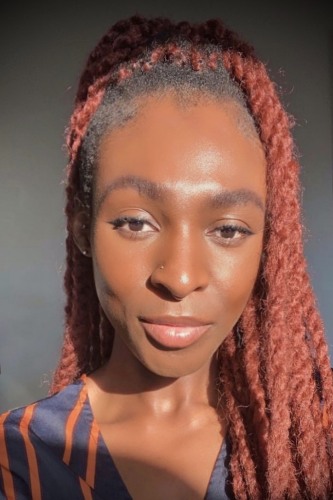
Idara Ndon MD'23
2021-2022 ODMA Diversity FellowIdara is originally from the California Bay Area, and is proud to be one of four children of Nigerian immigrants. She earned a Bachelor of Science in neuroscience at Brown, and worked at the Broad Institute of MIT and Harvard before returning to Providence for medical school.
Having served as an academic and social peer adviser as an undergraduate, Idara was eager to rekindle that role as an ODMA fellow. “People of color and folks underrepresented in medicine [URiM] have to navigate a lot of things alone,” both in general and in medical school, she says. “I wanted to work with students, to be a resource for them. I enjoy taking whatever I’ve learned and sharing with other folks to make their lives easier.”
Idara led peer-tutoring sessions, known as TEAM (Together Everyone Achieves More), for first-year students.
“First-year students come in and they’re not familiar with navigating the Medical School,” she explains. “Having second-year students who look like them, who share similar experiences, and can guide them through was really important. They played a really big role in helping teach the first-year students and facilitate their learning,” she says.
Idara also led discussions about race in medicine and the impacts of racism in scientific research as part of the BASCE (Brown Advocates for Social Change and Equity) fellowship, a year-long ODMA program for medical students, residents, and faculty. She created her own lectures on topics like grind culture and getting enough sleep. “That was fun turning those things into lectures, things that I found important, and to be able to discuss that with residents and attendings who’d hopefully teach it to their students,” she says.
Her year as an ODMA fellow allowed Idara to meet a number of personal and professional goals, like doing more public speaking, developing curricula, and bringing student concerns to faculty and administrators. “I like being the one to make decisions,” Idara says. “In the fellowship you can execute your own ideas, rather than take them to someone else to do it.”
After her fellowship, Idara completed a family and emergency medicine rotation on Block Island. She is now applying to emergency medicine residencies programs, and she hopes to continue her academic medicine and DEI work in her training and her career. “The ODMA fellowship helped shape the trajectory that I want to take in whatever professional endeavors I have,” Idara says.
-
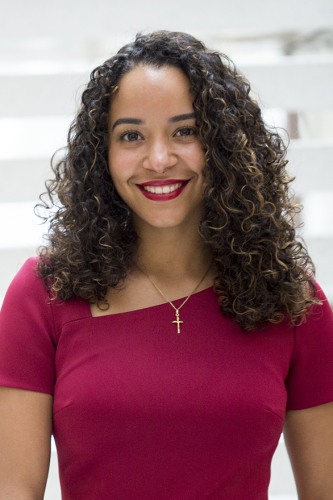
Gisel Bello MD'22
2020-2021 ODMA Diversity FellowGisel grew up in the housing projects of Harlem, the daughter of Dominican immigrants, and is a proud first-generation graduate. She earned her bachelor’s in biological sciences from the University of Rhode Island, where she founded Seeds of Success, a student-run organization committed to helping underrepresented students in the College of the Environment and Life Sciences attain a holistic educational experience during their time at URI.
At the Medical School Gisel held leadership positions in the Student National Medical Association and the Latino Medical Student Association, and served as a board member of the Women’s Clinic at Clinica Esperanza in Providence. Passionate about women's reproductive health, health disparities, and global health, she has traveled to the Dominican Republic, Guatemala, and Honduras to help provide medical services to rural communities. She also spent a month in the mountains of Peru to train in indigenous birthing practices. “It was one of those life-altering experiences,” she says.
The ODMA fellowship ticked a lot of boxes for her. “I have always been really interested in education, mostly around underrepresented students, because had I not received mentorship and guidance and love throughout my schooling, there’s definitely no way that I would be here today,” says Gisel, now an obstetrics and gynecology resident at Emory University.
Gisel created a podcast, You Are Med, during her fellowship year to share the stories of underrepresented students with future applicants. “As underrepresented people, there’s always an aspect of loneliness. It feels like it’s only ever you going through this struggle,” she says. “But whenever I shared [a particular challenge] with other underrepresented people, they’d say that happened to them too, and this is how they dealt with it. Those were the stories that got me through the harder moments of medical school.”
As a fellow, Gisel served as a liaison between students and the administration. “I thought that I had some good ideas for bridging those gaps,” she says. “As medical students we have such great insight on what it is to be a medical student that sometimes the faculty just forget because they’re however many years out.” She gained some understanding of how the Medical School was run, and had “deep conversations with faculty that have the ability to change the way things are done.”
The ODMA fellowship cemented Gisel’s interest in academic medicine, and thanks to her experience attending faculty meetings, and learning how they think and talk, she had “the confidence to say in residency interviews I would love to be a generalist because I want to have one foot in clinical and one foot in medical education,” she says. Every interviewer, she adds, wanted to hear all about her time with ODMA.
“The fellowship allows a lot of freedom, a lot of mentoring that gives you an upper hand when applying for residency,” she says. “I would definitely do it all over again.”
-
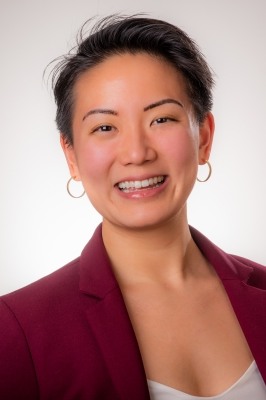
Angela Zhang, MD'21
2019-2020 ODMA Diversity FellowAngela is originally from Seattle, WA, and completed her undergraduate education at Duke University, after which she conducted clinical research in Baltimore. It was during this time that her involvement in health equity developed as she was exposed to systemic issues not only in the medical field but also in her community, including redlining.
During her time as a 2019-2020 ODMA diversity fellow, Angela continued dedicating her time to initiatives for antiracism and community health and equity. She is completing her internship year at the University of Washington/Seattle Children’s in pediatrics as part of the Health Equity Track.
As a fellow, Angela worked with physicians in training, from medical students to attendings, and participated in medical school recruitment fairs, applicant interview days and medical course curriculum planning. Additionally, she was awarded the Brown Advocates for Social Change and Equity fellowship, through which she obtained skills in leading conversations on topics such as race and disability in medicine. She continued participating in discussions on these matters with the Swearer Center during her ODMA fellowship. Having been a Mass Media & Cross-Cultural major, Angela created a series of audio essays for her main fellowship project, spotlighting issues in race-based medicine, climate change and community structure that had initially interested her in health equity work. For example, she chronicled the health consequences of rising temperatures in vulnerable communities under spatial inequity and redlining. Angela also worked with experts in environment and public health on ways to improve community health.
“That’s the biggest thing I took away from [the ODMA] year, the amount of things that we feel like we’re reinventing the wheel in medicine that already exist. The work is happening and is underrecognized,” she said.
Angela is also a founding team member of the Institute for Healing & Justice in Medicine. She has published articles on Asian-American solidarity in medicine, combatting medical racism in the curriculum, the significance of climate change on health outcomes and the issue of race-based medicine in kidney care.
Angela found topics at the core of her work also gaining interest amid the Black Lives Matter protests. “This work is now really prioritized and really emphasized,” she said.
Although Angela had experience participating in work addressing race-based medicine prior to her fellowship, she was originally uncertain whether she was fit for the position because, being Chinese-American, she identifies as minoritized in society but not underrepresented in medicine and did not have extensive experience with the ODMA. However, she chose to pursue the role following encouragement from her predecessor Radhika Rajan. The experience turned out to be a period of “immense growth,” she said.
Angela considers her work with the ODMA Office, Brown Minority Housestaff Association and other BASCE fellows and medical students to have been “really influential.” The knowledge, skills, and experience Angela gained from the position have since assisted her in approaching her role as a physician with continued dedication to addressing health equity challenges.
“This was probably the most influential thing that I’ve done thus far besides my major in college that shaped my career path not only tangibly … [and] allowed me to have these conversations and interface with people, but also idea-wise,” she said. “This position gave me so much insight into institutional change and what it meant to trailblaze something institutionally.”
Angela has been approached by others who have sought to hear about her work, and she believes her time as an ODMA fellow was a critical factor in her entry into the pediatrics residency Health Equity Track. She encourages those interested in health inequity and disparities to become fellows, supports the strengthening of such work in medicine, and hopes that further funding will be made available for students and faculty interested in pursuing related initiatives.
-
Radhika Rajan MD'20
2018-2019 ODMA Diversity FellowRadhika grew up in Queens, NY and Gainesville, FL. She came to The Warren Alpert Medical School of Brown University by way of the Program in Liberal Medical Education (PLME) program at Brown, where she concentrated in Anthropology and worked at the Sarah Doyle Women’s Center and the Brown Center for Students of Color. During her time in medical school, her interests included reproductive justice, narrative medicine and creating an inclusive curriculum and learning environment.
"It's important to realize that diversity and inclusion is every department and office's problem and opportunity to create change," she says. "The work that the ODMA does across the various hospital systems holds a lot more weight if it is done in conjunction or with the explicit support of the greater medical school administration."
-
Gabryel Garcia-Sampson '12 MPH'15 MD'19
2017-2018 ODMA Diversity FellowRy grew up in El Paso, TX, and at Brown earned a bachelor’s in ethnic studies, focusing on racism in science and medicine with the goal of addressing systemic inequalities in medicine. As a Mexican-American from a low-income background who identifies as nonbinary, Ry felt this experience could help other students in similar positions through the ODMA fellowship.
“Having the lived experience and being able to see where there were gaps in ways that we could offer more support … was part of what made me interested in being part of the ODMA and using the year that I had off to help fix some of those things,” Ry says.
As the inaugural ODMA diversity fellow, Ry was granted much freedom to shape the fellowship. Ry channeled relevant experiences, such as having been a Minority Peer Counselor program leader as an undergraduate, and felt empowered by the chance to work alongside faculty. Ry also helped develop new initiatives, including a program to help those underrepresented in medicine (URiM) receive guidance from other students.
To increase long-term success and investment in initiatives undertaken by others in the Medical School community, Ry started a database for these other projects to improve organization, track these efforts, and ensure continuity and a long-term commitment to the communities that the programs serve.
“From the perspective of having sustainability and not constantly recreating the wheel, we wanted to find a way to connect” those involved, Ry says. Ry also assisted and supported students in launching new projects, like connecting new students with local organizations and strengthening the LGBTQ curriculum.
Ry created and led the Brown Advocates for Social Change and Equity (BASCE) fellowship, which prepares students, residents, and faculty to lead diversity efforts and conversations at the Medical School, by creating a space where those interested in this work can collaborate and develop the necessary skills.
The ODMA fellowship offers “a lot of room for growth, a lot of room to develop different types of skills to get to work with folks that are already in leadership positions,” Ry says, fondly recalling working with ODMA staff and the lifelong relationships built through the program.
Ry just completed a family medicine residency at Duke University and was selected as a Pisacano Scholar, which offers funding, mentorship, and education to prospective leaders of family medicine. Applying skills learned from the ODMA fellowship and seeking to address barriers to health access among Black and Latinx communities, Ry worked with a large coalition of physicians, health administrators, and community organizations to establish COVID-19 testing and vaccination sites in Durham, NC. Ry is starting a fellowship that will enable a balance between clinical work and a project to increase health care access through mobile primary care.
“Health is one of the facets of the many types of inequalities and social determinants of health that people face,” Ry says. “The goal is that I would continue to be able to do that kind of work as a doctor, as a person who is part of these community coalitions.”